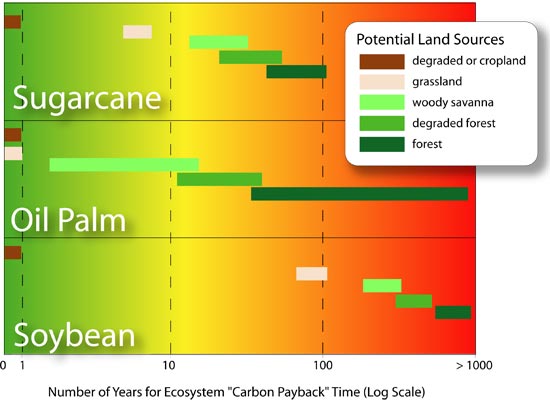A ‘red flag’ for expanding biofuels in the tropics
Biofuels, by recycling atmospheric carbon, are a potential boon to the world’s ailing climate. But efforts in the tropics to significantly expand biofuel production by replacing tropical forests with oil palm, sugarcane and other agricultural biofuels could, in fact, accelerate climate change, according to a new study published this week (July 9).
“We’re not saying that biofuels are a bad idea. Not at all. This study just indicates that biofuel production should not be occurring at the expense of tropical forests. Other ways of producing biofuels in the tropics — on degraded lands, former agricultural areas and so on — are clearly possible, and could have tremendous environmental, economic and social benefits.”
Jonathan Foley, professor in the Nelson Institute for Environmental Studies
Writing in the journal Environmental Research Letters, an international team of researchers cautions that expanding biofuel crop production in natural tropical ecosystems will lead to a significant increase in carbon emissions for decades and possibly hundreds of years.
“Cutting down rainforests to grow biofuel crops will likely never be a winning proposition for climate change or the environment, even considering projected improvements in agricultural and energy technology,” says Holly Gibbs, a UW–Madison graduate student who is the lead author of the new study.



Potential biodiesel and ethanol yields derived from new global database of crop yields and locations (Monfreda et al. 2008). Yields used to estimate potential carbon savings from crop-based biofuels produced across the tropics.
The study, based on powerful new geographic databases of the world’s existing agricultural lands and their yields as well as carbon stored in tropical ecosystems such as forests and savannas, confirms and expands upon earlier reports that replacing tropical forests with crops for biofuels will increase carbon emissions to the atmosphere, the primary cause of global warming.
Tropical ecosystems like forests, savannas and grasslands serve as storehouses for much of the world’s carbon, harboring an estimated 340 billion tons, about 40 times the amount released into the atmosphere each year, primarily through the burning of fossil fuels. When forests are cleared, not only is the future storehouse eliminated — in most cases permanently — the carbon sequestered in the forest is also released to the atmosphere, as fire remains a primary method for clearing tropical forests.
The result, says Gibbs and her colleagues, is increased “carbon debt” because the carbon savings from using biofuels in place of petroleum fuels is generally much less than the carbon stored in tropical forests.
The new study, say its authors, gives renewed urgency to developing policies and economic incentives to protect tropical forests. The world’s last large tracts of undeveloped land exist in the world’s tropical zones, and are viewed by many, including governments, as ripe for transformation into biofuel croplands.
Earlier studies suggesting that the transformation of tropical ecosystems to biofuel crops would increase the world’s carbon debt were controversial because anticipated advances in agricultural and energy technologies were not taken into account. The new study, says Gibbs, does consider future scenarios of biofuel production and supports the conclusions of the previous work.
Although the new study, which was funded by the U.S. Department of Energy and NASA, does question the wisdom of converting tropical forests for biofuel production, Gibbs and her colleagues say there are potential carbon gains to be had by directing new biofuel crop production to other non-forested lands: “Sustainable production of agricultural biofuels on degraded lands that are unsuitable for food production could provide immediate environmental benefits,” according to Gibbs.
According to Jonathan Foley, a co-author on the study and a professor in UW–Madison’s Nelson Institute for Environmental Studies, the study is not an argument against biofuels.
“We’re not saying that biofuels are a bad idea. Not at all,” Foley explains. “This study just indicates that biofuel production should not be occurring at the expense of tropical forests. Other ways of producing biofuels in the tropics — on degraded lands, former agricultural areas and so on — are clearly possible, and could have tremendous environmental, economic and social benefits.”
In addition to Gibbs and Foley, authors of the new study include Matt Johnston, Tracey Holloway and David Zaks, all of the Center for Sustainability and the Global Environment, part of UW–Madison’s Nelson Institute for Environmental Studies. Additional authors are Chad Monfreda of Arizona State University’s Consortium for Science Policy and Outcomes, and Navin Ramankutty of McGill University.

The ecosystem “carbon payback” time (ECPT) for potential biofuel crop expansion pathways across the tropics. ECPT is defined as the time required for biofuel carbon offsets to repay the carbon debt created from clearing and burning tropical vegetation to plant biofuel crops. The bars represent the range of ECPT across the humid, seasonal and dry tropics for different combinations of land sources and biofuel feedstock crops across the tropics. The green to red background represents a stop light – indicating green for “go” in replacing degraded lands, yellow for “caution” in replacing grasslands, woody savannas and red for “stop” replacing forests for biofuel crop expansion.




